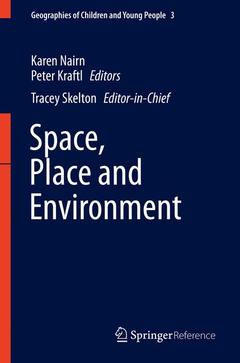Description
Space, Place, and Environment, 1st ed. 2016
Geographies of Children and Young People Series, Vol. 3
Language: English
Support: Print on demand
Description
/li>Biography
/li>Comment
/li>
This volume demonstrates the multiple ways that space, place and environment interact with children and young people?s lives. The contributors offer a suite of cutting-edge tools and lively examples for theorising how space, place and environment are (con)figured in children and young people?s lives. They demonstrate how the social borders between childhood and adulthood, and spatial borders between rural and urban, countries, neighbourhoods, and institutions, are relationally produced.
The volume is organised into five sections: Indigenous Youth: Space and Place; Children, Nature and Environmental Education; Urban Spaces; Home/less Spaces; and Border Spaces. These themes signal the major issues in cutting-edge children?s geographies scholarship. Diverse geographical contexts are covered in this volume ? including Australia, Brazil, Canada, Cyprus, Ecuador, India, Indonesia, Kazakhstan, Mexico, Morocco, New Zealand, Peru, Slovenia, Spain, the United Kingdom and the United States.
All of the contributors advocate greater recognition of children and young people?s spatial rights, whether in the home, outdoors, at school, crossing borders, in public and digital spaces, or simply looking for a safe place to sleep. Children and young people?s perspectives on space, place and the environment, and their desire for places to call their own, tie the volume together. The volume is a testament to the politics of the spaces and places of childhood, highlighting how many children and young people face obstacles to living well and to living where they desire.
Associate Professor Karen Nairn is currently based at the Otago University College of Education, Dunedin, New Zealand. Her current research focuses on youth identities and post-school transitions. Her recent book Children of Rogernomics. A neoliberal generation leaves school, connects the stories of young people with the wider social and economic story of New Zealand during the last three decades.More broadly, her research focuses on processes of exclusion in education shaped by gender, sexuality and race. Her research portfolio is interdisciplinary in nature with contributions to education, youth studies, geography, and qualitative research. Prior to her university career, she was a high school geography teacher.
Her future research plans revolve around investigating how diverse collectives of young people think about a future threatened by climate change, economic precarity, and political instability. Her new research intends to find out what young people consider the most urgent issues to address, how hope influences their collective actions for change, and how their identities are shaped in the process.Tracey Skelton is Associate Professor of Human Geography in the Department of Geography at the National University of Singapore. She was previously Professor of Critical Geographies at the University of Loughborough in the UK. The essential elements of her research career focus on people who are socially, politically, and intellectually excluded. Her early work focused on the Caribbean and issues of gender and racial inequality, feminist geographies, and methodological analysis. She has contributed to culture and development debates, particularly through her longitudinal research on the island of Montserrat. Recently, A/P Skelton returned to this field of scholarship through research with volunteers and host organizations in Cambodia as part of a major comparative and collaborative project on development par
Offers a comprehensive and unique reference work on the subject of children’s and young people’s geographies
Presents easily digested information supported by illustrative material
Comprises a high quality and cohesive work from authoritative figures who worked together as volume editors
Speaks to a wide range of audience from geographers to sociologists, demographers to social workers, and policy makers to development agencies
Enables discovery of the most recent information through continuous updates on SpringerReference.Com
Includes supplementary material: sn.pub/extras




